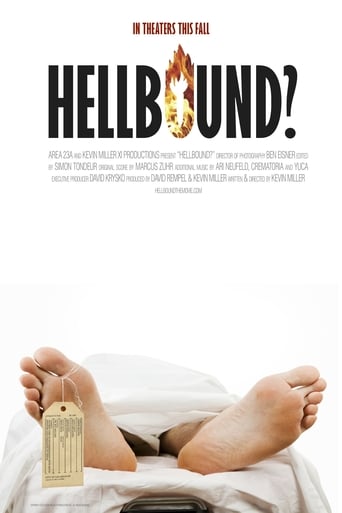belair82g
There is the good and bad with this film. The bad is many people telling lies about Hell by simply telling us their opinion and how they feel and therefore deceiving people who are watching this movie. So many of the people interviewed in this documentary don't want to believe in Hell and want to convince us that Hell isn't real. But I am very thankful that Mark Driscoll was in this movie to tell us the truth about Hell. Hell is real; it is forever; and most people go there. The only hope is Jesus Christ and for us to put our trust in Him and to repent. I still found this documentary interesting and worth watching and recommend this movie but I do not want anyone to be deceived.
gavin6942
If God is our pure, all-loving creator, can he really turn his back on sinners and allow them to suffer for eternity in hell? Where did this vision of hell come from? Is it possible we have got hell wrong? Or are recent challenges to the traditional view merely an attempt to avoid the inevitable? This documentary involves talking to a lot of people about hell, from pastors to Westboro members, to atheists.... to Gwar. Some believe, some do not, some argue that hell cannot be eternal if it exists because that is incompatible with a loving god.Of all the various concepts of hell -- which is right? Are any right? I think this provided a good overview of the problem, but never really got to the meat and potatoes. Are some theories better than others? Is the whole idea just not possible to sort out? I think a bit more depth would be nice...
gizmomogwai
Hellbound? is a documentary asking pretty important questions of religion, life and death, summed up in a basic question: Is hell real? With these kinds of topics, too often you expect extremism, arrogant atheism on the one hand ("Of course this stuff isn't real, you're stupid to believe it!"), religious arrogance on the other ("You're all going to hell, except me!"). Instead, here's a documentary that can make an argument while considering varied viewpoints, and even a little history (What did Old Testament Jews believe, and what does the destruction of Jerusalem have to do with this?)The documentary starts off giving a slight impression that it's going to argue hell is a total fiction- we visit an atheist, Robert McKee, who the filmmakers want to hear how to tell a story from, as well as the always-charming Westboro Baptist Church, so the viewer associates belief in hell with lunacy. Then, suddenly it's about how if you don't believe in hell, you're not a Christian at all. But as the film goes on, the more ideas we hear- what if hell is temporary, or a process of judgment, or just how ancient Christians literally tossed bodies into a valley? Some of the points, including that it's tremendously arrogant to think you have all the answers, and that you can dictate who goes to heaven and hell, are right on. Numerous interesting questions are visited in the process, including whether God is all-powerful, who Satan is and so on. What we have at the end is an intelligent discourse, and a fine film to see for anyone interested in faith, any faith, or what happens after we die.
Mike Goetz
Unlike Michael Moore, whose documentaries present a clearly biased and one-sided view, Kevin Miller's documentary on the nature of hell is nicely balanced and thought-provoking. True, it becomes clear that the filmmaker is leaning towards a position on the subject but I'm willing to grant him that, as his leanings towards Christian universalism run so counter to the popular protestant understandings of hell.As a critique, the film has a gaping hole in the shape of the catholic view on hell -- there is no mention of the doctrine of purgatory, which would have added significant weight to the discussion. Given the catholic church's position in the development of Christian doctrine, the decision to ignore that voice is disappointing.The film is clearly meant for an audience of 'believers', but the material is well-presented and offers an opportunity for discussion amongst all people, regardless of their faith. That, I think, is the best quality for documentary films like this one -- that it can facilitate meaningful and intelligent discussion without the awkward discomfort of trying to artificially promote an agenda.



